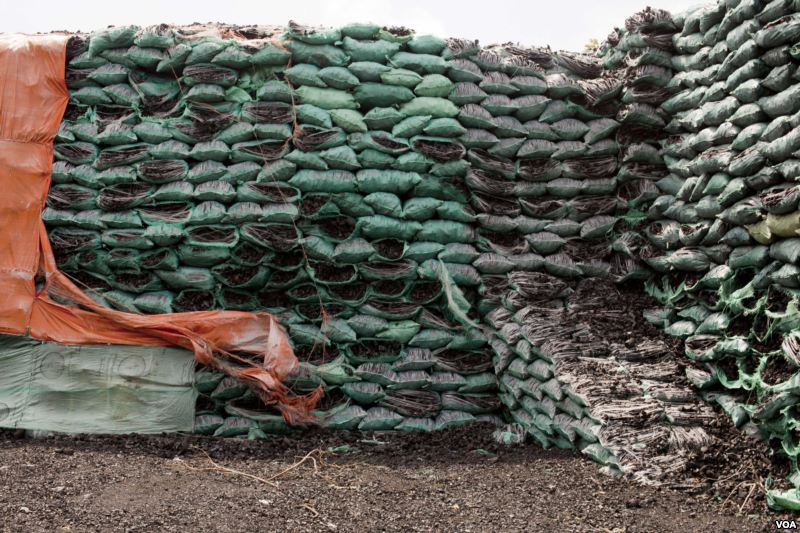
Roopa Gogineni
Thursday, July 12, 2012

The stockpile of charcoal in Bur Gabo is estimated to be worth several millions dollars, Bur Gabo, Somalia, July 5, 2012. (Roopa Gogineni/VOA)
In Bur Gabo, Somalia, a city of charcoal sits by the sea, waiting for boats that have not come since October.
In February of this year, the U.N. Security Council passed a resolution banning the export of Somali charcoal. The resolution aimed to stifle one of al-Shabab’s main sources of revenue in addition to ending the environmental damage caused by charcoal production.
The Kenyan military and the Ras Kamboni Brigade took control of Bur Gabo from al-Shabab militants last October, at which point they began enforcing the embargo.
Ali Noor Kasim, an elder in the nearby town of Ras Kamboni, speaking through a translator, expressed his concern.
"Apart from the fishing it was one of the major livelihood options that has been there for quite sometime, and stopping it has created a lot of deterioration of the income people used to get," he said. "The consignment there will affect hugely the lives and the livelihood of the people."
Somalia has a long history of producing charcoal, most of which is sent to the Gulf States for use in shisha-pipes.
Local traders told VOA that each sack of charcoal sells for $4 in Bur Gabo and approximately $15 in Dubai. They estimate the consignment sitting in Bur Gabo is worth several millions of dollars.
"During the al-Shabab era, charcoal business was booming, people getting livelihood there, there was no agencies coming and supporting the people," explained Ali Noor Kasim. "Now the charcoal has been stopped and agencies are coming and we are very hopeful international agencies will provide alternative livelihoods."
Despite nine months of stability, international agencies have yet to arrive in Bur Gabo.
Charcoal dealer Mohammad Abdullahi is worried about his unmoving stock. During the rainy season the bags containing the charcoal disintegrate and must be replaced.
"It is still there for almost a year, there is more money lost because each and every time we are changing the sacks, no transportation to the Dubai side," said Abdullahi. "It is still there. This is the fifth loss we've getting, five times we've changed all the bags."
Experts believe the deforestation caused by charcoal production contributed to the drought and subsequent famine last year in Somalia.
Many in Bur Gabo acknowledge the environmental consequences, but find they have no alternative source of income as Ali Noor Kasim explains.
"We are aware there is environmental degradation, we are aware of that, but most of the capital, but most of the business people's money is already invested in that," he said
Balancing environmental concerns with the economic future of the country continues to be a challenge in Somalia.